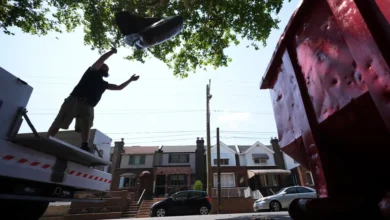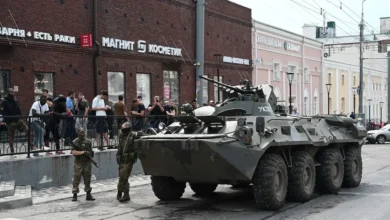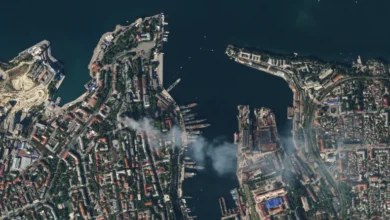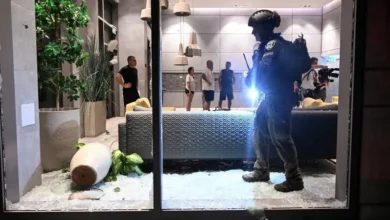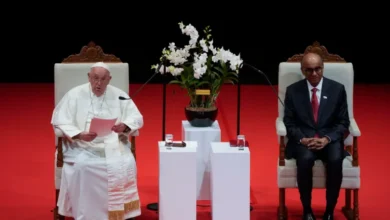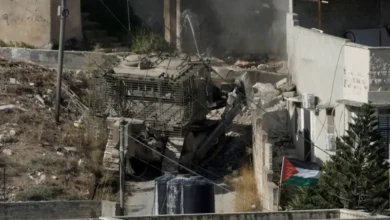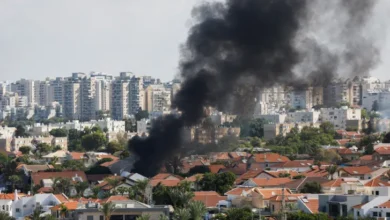The Aleppo electronic artists using music to heal in Gaziantep
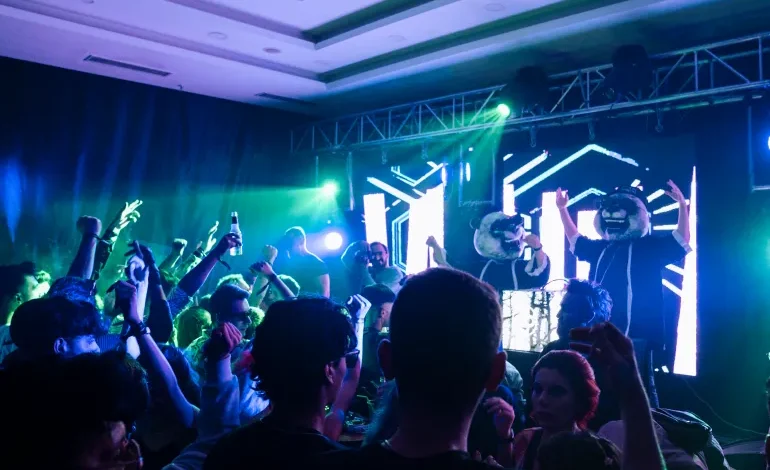
Amr Helwani’s fingers swiftly moved the knobs of a DJ mixer up and down while coloured neon lights and white smoke began to swamp the tiled garden of the old Ottoman house where he had set up his console.
The 33-year-old DJ’s techno music energised partygoers on a cold late January night in Gaziantep, a city in southeastern Turkey on the border with Syria. Amr has been in the city since 2013. He, like many of those dancing, fled the Syrian war from Aleppo, less than a two-hour drive away.“We break the sound barrier tonight,” joked Amr, a tall, unassuming man dressed in a black T-shirt, referring to the deafening music. “But no, really, we’re simply trying to break down language and cultural barriers here. Turkish [people] and Syrians … we have very similar traditions but the language is different. Techno is all about the beats, not words. It makes it easier to dance together.”
Amr is one of the resident DJs of Room41, an itinerant techno and electronic music club started by a Syrian refugee that has entertained Gaziantep locals for years. It has also provided an outlet for Syrians to come together to let off steam and meet like-minded people passionate about music.
Little did Amr know, however, that January 28 would signal the last of his shows for a while. “See you all in two weeks!”, he said as he wrapped up the night at 3am.
Just a little more than a week later, catastrophic earthquakes struck southeastern Turkey and northwest Syria, changing the lives of Turks and Syrians forever. More than 50,000 people were killed. In Gaziantep, about 3,000 died, while thousands remain displaced. With continuous aftershocks for weeks and an entire city coping with the trauma of loss and devastation, the lights of Syrian techno nightlife switched off – just as they had during the war.“It’s scary how much it reminded us of the war days: The screams, the sorrow, the displacement… but we promised our audience that music would be back stronger than ever to cheer us up,” Amr said in May from Sakulta, a crowded café in central Gaziantep that sells tickets to Room41. His apartment was spared significant damage but he relocated temporarily further west to the Mediterranean city of Mersin to escape the stress of the constant aftershocks.
Fleeing with cultural heritage
Since the beginning of the Syrian conflict in 2011, some 3.7 million refugees have settled in Turkey. The majority of them now live along its southeastern borders, geographically and culturally closer to the motherland.
From old 19th-century Ottoman houses with large domes and black-and-white striped horseshoe-shaped arches to the towering citadel in Gaziantep’s city centre – partly destroyed by the quakes – and narrow cobblestone streets filled with blacksmiths’ workshops and the food smells from eateries, many corners of the city conjure images of pre-war Aleppo for Syrians.
Today, more than half a million Syrians live in this city – a crossroads between Turkish, Kurdish and Arab cultures. Although more than a decade of Syrian presence has led to some friction, it has also reshaped the social and urban face of Gaziantep.Syrian shops, as well as restaurants and cafés offering traditional live music, are found in abundance in the city centre’s main streets. Since the earthquakes in February, the majority of these have reopened with minor damages.
“Among the few things we were able to bring with us while running away from the conflict, our cultural heritage was definitely part of our basic baggage,” said Rami Magharbeh who comes from Aleppo. He is the founder of Douzan Art and Culture, a Gaziantep-based organisation working to preserve Syrian arts in exile.“And that includes the potential of new forms of artistic expressions, such as electronic music, which our youth had just begun to discover until the war came,” the 38-year-old with his grey, curly hair tied into a ponytail, added. He was speaking from the rooftop of Douzan’s base – an imposing, well-kept Ottoman house in Gaziantep’s Armenian district.
Through the efforts of cultural organisations and enterprising individuals, Aleppo’s nightlife has moved about 100 kilometres (62 miles) across the border. In what was once a sleepy city, Syrian DJs and electronic music aficionados have recreated the forgotten atmosphere of the nascent scene they left behind.
Focus on the present
Secret raves and underground parties had just started to take off in Aleppo when the war erupted, said Batoul Mohammad, a tall charismatic electronic-music producer with long black hair who divides her time between Gaziantep and Istanbul.
“That abruptly stopped its development, just as our generation was ready to show what we are capable of,” explained the deep-voiced, 36-year-old. “I was a listener at those parties and I spontaneously brought those lessons here in Gaziantep where I realised there was no nightlife. That’s one of the things I missed the most about home.”
Originally from the Syrian city of Homs, she loved what Aleppo had to offer when she could afford to visit on weekends – from spoken word events to rock music concerts. The flourishing cultural atmosphere there was what inspired her to work in the performing arts.
In 2013, at the age of 25, she crossed the border alone into Turkey. Her parents, although they wanted her to stay, supported her decision to pursue her ambitions. She found an apartment in Gaziantep where – determined to work in music – she would spend an average of seven hours a day teaching herself to use music mixing software and watching videos to study DJ sets.
“Focusing on such complicated tasks helped my mind focus on the present moment, rather than fidgeting about my past,” Batoul explained, referring to the pain of leaving her family behind and coming to a country where she often felt unwelcome and experienced verbal abuse just for being Syrian.
For seven years, she worked odd jobs and put her music on the platform SoundCloud. She struggled to find a community of like-minded artists until 2020, when Room41’s founder Nashwan Jamali reached out via Instagram and invited her to perform at one of his events.
In 2013, at the age of 25, she crossed the border alone into Turkey. Her parents, although they wanted her to stay, supported her decision to pursue her ambitions. She found an apartment in Gaziantep where – determined to work in music – she would spend an average of seven hours a day teaching herself to use music mixing software and watching videos to study DJ sets.
“Focusing on such complicated tasks helped my mind focus on the present moment, rather than fidgeting about my past,” Batoul explained, referring to the pain of leaving her family behind and coming to a country where she often felt unwelcome and experienced verbal abuse just for being Syrian.
For seven years, she worked odd jobs and put her music on the platform SoundCloud. She struggled to find a community of like-minded artists until 2020, when Room41’s founder Nashwan Jamali reached out via Instagram and invited her to perform at one of his events.
